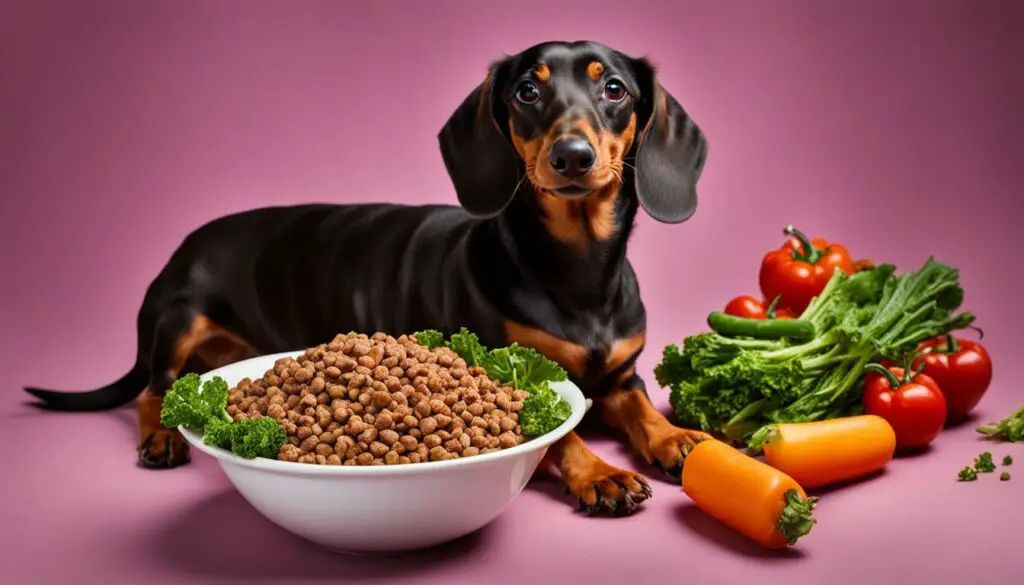Dachshunds are a unique breed with specific health needs. In this complete guide, I will help you find the best dog food for your Dachshund. We will explore the different types of dachshunds and their nutritional needs, key ingredients to look for in dog food, ingredients to avoid, and recommended brands for puppies, adult dachshunds, and those with specific dietary concerns. Let’s ensure your Dachshund stays healthy and happy with the right nutrition.
Key Takeaways:
- Choosing the right dog food is crucial for your Dachshund’s health and well-being.
- Consider the specific nutritional needs of your Dachshund based on their age, size, and any dietary concerns.
- Look for dog food brands that are specially formulated for Dachshunds and contain high-quality ingredients.
- Avoid dog food with excessive carbohydrates, artificial ingredients, and potential allergens.
- Consult a veterinarian for personalized dietary recommendations for your Dachshund.
Understanding Dachshund Dietary Needs
To provide the best nutrition for your Dachshund, it’s important to understand their dietary needs. Dachshunds come in different sizes – standard and miniature – and have varying caloric requirements. Standard Dachshunds need more food and calories than miniature Dachshunds. The National Research Council of the National Academies recommends an average daily caloric intake of 922 calories for standard dachshunds and 404 calories for miniature dachshunds. Proper portion sizes are also crucial, especially for weight management.
When it comes to feeding your Dachshund, it’s important to consider their age, activity level, and overall health. Puppies require a diet that supports their growth and development, while adult Dachshunds need a balanced diet to maintain their health. Senior Dachshunds may have specific dietary needs, such as joint support or weight management.
Nutritional Requirements for Dachshunds
In addition to understanding portion sizes, it’s important to provide your Dachshund with a diet that meets their nutritional requirements. Dachshunds need a diet that is high in protein, moderate in fat, and low in carbohydrates. Look for dog food that lists a high-quality source of animal protein like chicken, beef, or fish as the first ingredient. Avoid foods that contain fillers and artificial additives.
It’s also important to provide your Dachshund with a diet that is rich in vitamins and minerals. Look for dog food that contains fruits and vegetables, which provide essential nutrients for overall health and wellbeing. Omega-3 fatty acids are also beneficial for Dachshunds, as they support skin and coat health.
| Life Stage | Caloric Intake (per day) | Protein Requirement | Fat Requirement |
|---|---|---|---|
| Puppies | Varies based on weight and age | 22-28% | 8-12% |
| Adults | 922 calories (standard dachshunds) 404 calories (miniature dachshunds) |
18-24% | 10-15% |
| Seniors | Varies based on activity level and health | 18-24% | 10-15% |
Remember to consult with your veterinarian to determine the specific nutritional needs of your Dachshund, as individual requirements may vary depending on factors such as age, health conditions, and activity level. By providing your Dachshund with a balanced diet that meets their specific needs, you can help ensure they live a long, healthy, and happy life.

Key Ingredients for a Dachshund’s Diet
A healthy, active dachshund requires a diet that is rich in key ingredients to ensure optimal nutrition. These ingredients play a vital role in their overall health and wellbeing. Let’s take a closer look at the ideal sources of protein, vegetables, omega oils, and calcium that should be included in a dachshund’s diet.
Ideal Source of Protein for Dachshunds
Protein is an essential component of a dachshund’s diet as it helps to support their muscles, tissues, and overall growth. Look for dog food that includes high-quality, easily digestible sources of protein such as chicken, beef, or fish. These meat sources provide the necessary amino acids that are vital for your dachshund’s health.
Vegetables for Dachshunds
Vegetables are an essential part of a dachshund’s diet as they provide essential fiber, vitamins, and minerals. Incorporating vegetables like carrots, peas, and sweet potatoes into their meals can help promote good digestion and overall health. Remember to cook or puree vegetables to ensure easy digestion for your dachshund.
Omega Oils for Dachshunds
Omega oils, particularly omega-3 fatty acids, are beneficial for dachshunds as they promote healthy skin and coat. These oils can help reduce inflammation and itching, which can be common issues for dachshunds with long hair. Look for dog food that includes natural sources of omega oils such as fish oil or flaxseed oil.
Calcium in Dachshund Diet
Calcium is essential for the development and maintenance of strong bones in dachshunds. It is particularly important for puppies and senior dachshunds. Look for dog food that is fortified with calcium or includes ingredients such as bone meal or ground eggshells to ensure your dachshund gets the necessary amount of calcium in their diet.
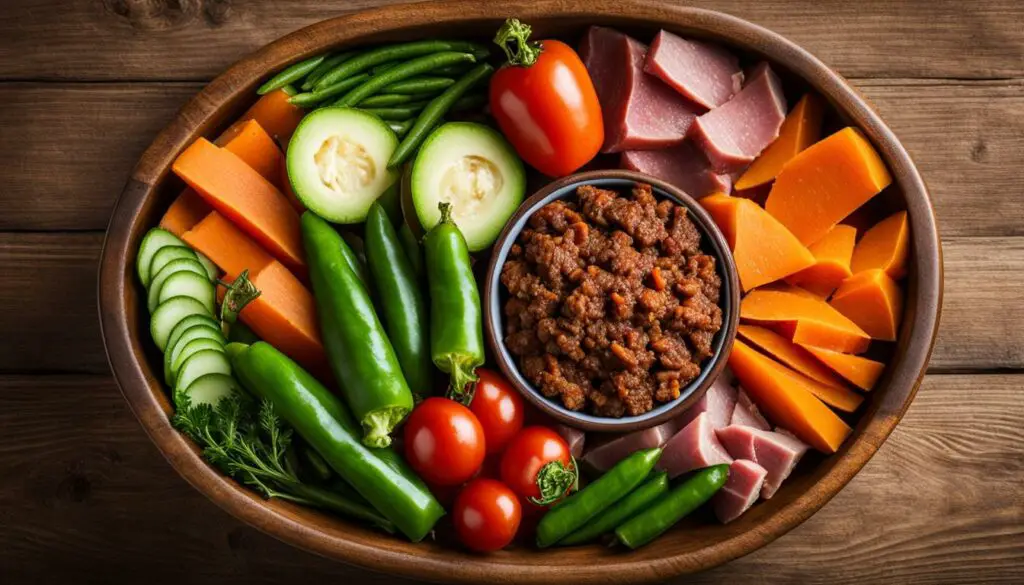
Summary:
When formulating a diet for your dachshund, it’s important to prioritize key ingredients that provide optimal nutrition. Choose dog food that includes high-quality sources of protein, a variety of vegetables, omega oils for healthy skin and coat, and adequate calcium for bone health. These key ingredients will help keep your dachshund happy, healthy, and full of energy.
Ingredients to Avoid in Dachshund Food
When choosing dog food for your dachshund, it’s important to be cautious about the ingredients you feed them. Dachshunds can be prone to food allergies, so it’s best to avoid diets that contain potential allergens. Additionally, certain ingredients can be harmful to their overall health. Here are some ingredients to avoid in dachshund food:
1. Carbohydrates:
While carbohydrates are an important source of energy, excessive amounts can lead to weight gain and potential health issues in dachshunds. High-carb dog food can also cause spikes in blood sugar levels, which can be problematic for dachshunds prone to diabetes. It’s best to choose dog food with a moderate carbohydrate content or opt for grain-free options.
2. Fats:
Fats are essential for a dachshund’s diet, as they provide energy and support various bodily functions. However, it’s important to avoid dog food that contains excessive amounts of unhealthy fats. Too much fat can contribute to obesity, which can lead to joint issues and other health problems in dachshunds. Look for dog food that includes healthy fats, such as omega-3 fatty acids from fish oil.
3. Artificial Ingredients:
Artificial ingredients, such as artificial colors, flavors, and preservatives, should be avoided in dachshund food. These additives can potentially cause allergic reactions and digestive upset in sensitive dachshunds. Opt for dog food that uses natural ingredients and avoids artificial additives.
By avoiding these ingredients and choosing high-quality dog food, you can help ensure the overall health and well-being of your dachshund.
| Ingredient | Reason to Avoid |
|---|---|
| Carbohydrates | Can lead to weight gain and blood sugar spikes |
| Fats | Excessive amounts can contribute to obesity and health issues |
| Artificial Ingredients | Potential allergenic and digestive upset |
Top Picks for Dachshund Dog Food
When it comes to finding the best dog food for your Dachshund, there are several top-rated options to choose from. These brands are known for their quality ingredients and nutritionally balanced formulas that cater to the specific needs of Dachshunds. Let’s explore some of the top picks for Dachshund dog food:
Orijen Adult Dog Food

Orijen Adult Dog Food is a highly regarded brand that offers a high protein content and quality ingredients. It is made with fresh, regional ingredients and does not contain any artificial preservatives or fillers. This dog food is suitable for Dachshunds of all ages and provides a balanced diet for optimal health and wellbeing.
Royal Canin Dachshund
Royal Canin offers a specialized formula specifically designed for Dachshunds. This breed-specific dog food addresses the unique needs of Dachshunds, such as bone health and weight management. The formula contains the right balance of nutrients to support their overall health and is highly recommended by veterinarians.
Hill’s Science Diet Sensitive Stomach Dog Food
Hill’s Science Diet Sensitive Stomach Dog Food is a great choice for Dachshunds with sensitive stomachs. This dog food is made with easily digestible ingredients that are gentle on the digestive system. It contains prebiotic fiber to promote healthy digestion and is free from artificial colors, flavors, and preservatives.
Purina Pro Plan Weight Management Wet Dog Food
Purina Pro Plan Weight Management Wet Dog Food is recommended for Dachshunds struggling with obesity. This dog food is specifically formulated to help manage weight while still providing essential nutrients. The wet food texture is also appealing to Dachshunds and can help increase their water intake.
Taste of the Wild Pacific Stream Grain-Free Dry Dog Food
Taste of the Wild Pacific Stream Grain-Free Dry Dog Food is a popular option for Dachshunds with specific taste preferences. This grain-free formula features real fish as the main ingredient and is packed with omega fatty acids for a healthy coat and skin. It also contains fruits and vegetables to provide essential vitamins and minerals.
These top picks for Dachshund dog food offer a variety of options to cater to different dietary needs and preferences. Whether you are looking for a high-protein formula, a specialized breed-specific diet, or a solution for specific health concerns, there is a brand that can meet your Dachshund’s nutritional requirements.
The Benefits of Raw Food for Dachshunds
When it comes to feeding our dachshunds, providing them with a raw food diet can offer numerous advantages. Raw food, which consists of natural, unprocessed ingredients, provides dachshunds with species-appropriate nutrition, promoting their overall health and well-being.
A raw diet for dachshunds ensures that they receive essential nutrients in their most natural form. This includes high-quality proteins, which are vital for muscle development and repair. Raw meat sources like chicken, beef, and lamb provide easily digestible protein, allowing dachshunds to absorb the necessary amino acids for optimal growth and maintenance.
Furthermore, raw food contains beneficial enzymes and probiotics that support digestion and boost the immune system. These elements help dachshunds maintain a healthy gut, which is essential for their overall health. By feeding raw, we can reduce the risk of inflammation and common health issues, such as obesity, joint problems, dental complications, and skin allergies.
| Advantages of Raw Food for Dachshunds: |
|---|
| Species-Appropriate Nutrition: Raw food aligns with a dachshund’s natural diet, providing the nutrients they would consume in the wild. |
| High-Quality Protein: Raw meat sources offer easily digestible protein, supporting muscle development and repair. |
| Enzymes and Probiotics: Raw food contains beneficial enzymes and probiotics that promote a healthy gut and boost the immune system. |
| Reduced Health Issues: Feeding raw can help prevent common health issues in dachshunds, such as obesity, joint problems, dental complications, and skin allergies. |
By incorporating a raw food diet into our dachshund’s routine, we can provide them with the nutrients they need to thrive. However, it’s essential to consult with a veterinarian before making any dietary changes to ensure that raw feeding is appropriate for your individual dachshund. Each dog has unique nutritional requirements, and a vet can provide personalized guidance to ensure a balanced and nutritionally complete diet.
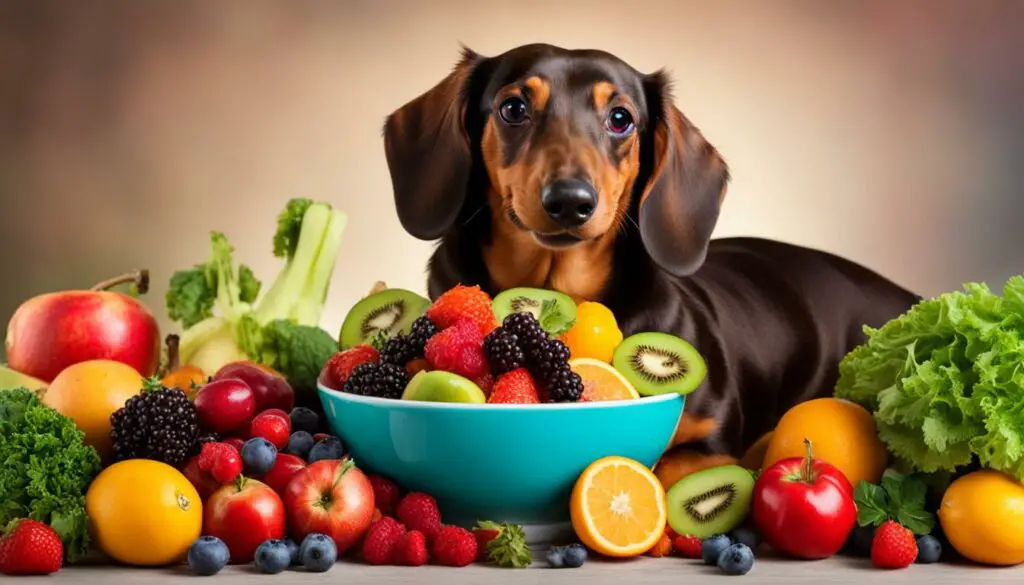
Best Dog Food Brands for Dachshunds with Skin Issues
Dachshunds with skin issues require special attention to their diet. Opting for grain-free dog food can help minimize potential allergic reactions and alleviate skin problems. Natural dog food brands that prioritize high-quality protein, healthy fats, and a variety of fruits and vegetables can also contribute to improved skin conditions in dachshunds.
When searching for the best dog food for dachshunds with skin issues, look for products that are free from common allergens such as grains (wheat, corn, and soy) and artificial additives. Instead, prioritize natural ingredients that provide essential nutrients to support skin health.
“Feeding a grain-free and natural diet to dachshunds with skin issues can help reduce the risk of triggering allergic reactions and promote healthier skin and coat.” – Veterinarian Dr. Emily Brown
Here are some of the top dog food brands recommended for dachshunds with skin issues:
| Brand | Key Features | Price Range |
|---|---|---|
| Orijen | Grain-free, high-protein formulas with natural ingredients. | $$$ |
| Wellness CORE | Grain-free options with premium proteins and essential nutrients. | $$ |
| Canidae Grain-Free | Grain-free recipes with limited ingredients and optimal nutrition. | $$ |
| Merrick Grain-Free | Grain-free recipes with real meat and balanced nutrition. | $$ |
Always consult with your veterinarian before making any dietary changes for your dachshund, especially if they have specific skin issues. They can provide personalized recommendations based on your dachshund’s unique needs and help you find the best dog food brand that will support their skin health.
Recommended Dog Foods for Dachshunds by Age
As dachshunds go through different life stages, their nutritional needs change. It’s important to choose the right dog food to support their growth, development, and overall health. Here are some recommended dog food options for dachshunds based on their age:
Dog Food for Dachshund Puppies
Dachshund puppies require a diet that supports their rapid growth and development. Look for puppy-specific formulas that provide a balanced blend of protein, healthy fats, vitamins, and minerals. These formulas should also be easily digestible to prevent any stomach issues. Some popular options for dachshund puppies include Royal Canin Dachshund Puppy and Blue Buffalo Wilderness Puppy.
Best Dog Food for Adult Dachshunds
Adult dachshunds need a well-rounded diet that provides them with the necessary nutrients to maintain their overall health. Look for dog food formulas that are specifically formulated for adult dogs and provide the right balance of protein, carbohydrates, and fats. Some recommended options for adult dachshunds include Wellness Complete Health Adult Dog Food and Nutro Ultra Adult Dry Dog Food.
Senior Dog Food for Dachshunds
As dachshunds enter their senior years, their nutritional needs change to support their aging bodies. Look for senior-specific formulas that are lower in calories to prevent weight gain and include ingredients that support joint health, such as glucosamine and chondroitin. Some top choices for senior dachshunds include Blue Buffalo Wilderness Senior Dog Food and Merrick Grain-Free Senior Recipe.
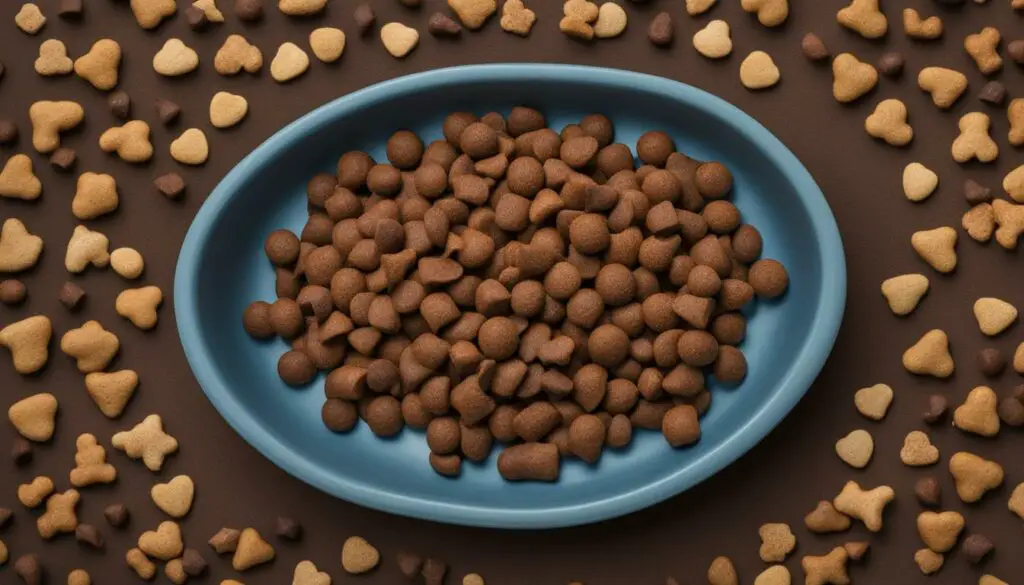
| Age | Recommended Dog Food Brands |
|---|---|
| Dachshund Puppies | Royal Canin Dachshund Puppy, Blue Buffalo Wilderness Puppy |
| Adult Dachshunds | Wellness Complete Health Adult Dog Food, Nutro Ultra Adult Dry Dog Food |
| Senior Dachshunds | Blue Buffalo Wilderness Senior Dog Food, Merrick Grain-Free Senior Recipe |
Remember, the specific nutritional needs of your dachshund may vary, so it’s always a good idea to consult with your veterinarian for personalized dietary recommendations based on your dachshund’s age, size, and overall health.
Choosing the Right Food for Dachshunds with Joint Issues
When it comes to dachshunds with joint issues, choosing the right food can make a significant difference in their overall wellbeing. Joint health is crucial for these long-bodied dogs, as they are prone to conditions like Intervertebral Disc Disease (IVDD) that can impact their mobility and quality of life. To support their joint health, it’s important to provide them with a diet that contains key ingredients known for their beneficial effects.
Dog food for dachshunds with joint issues should include ingredients such as glucosamine, chondroitin, and omega-3 fatty acids. Glucosamine and chondroitin are natural compounds that help promote joint health and reduce inflammation. They support the formation and repair of cartilage, which is vital for dachshunds with joint issues. Omega-3 fatty acids, commonly found in fish oils, have anti-inflammatory properties that can help alleviate joint pain and improve mobility.
Additionally, if your dachshund has joint issues exacerbated by obesity, it’s important to consider dog food specially formulated for weight management. These foods are designed to help your dachshund maintain a healthy weight, relieving pressure on their joints and reducing the risk of further complications. They typically have a lower calorie content and higher fiber content to promote satiety and support weight loss.
Consulting with your veterinarian is essential in choosing the right food for dachshunds with joint issues. They can provide personalized recommendations based on your dachshund’s specific needs and help you create a balanced diet plan. Remember that proper nutrition plays a crucial role in managing joint issues in dachshunds, and with the right diet, you can support their joint health and overall wellbeing.
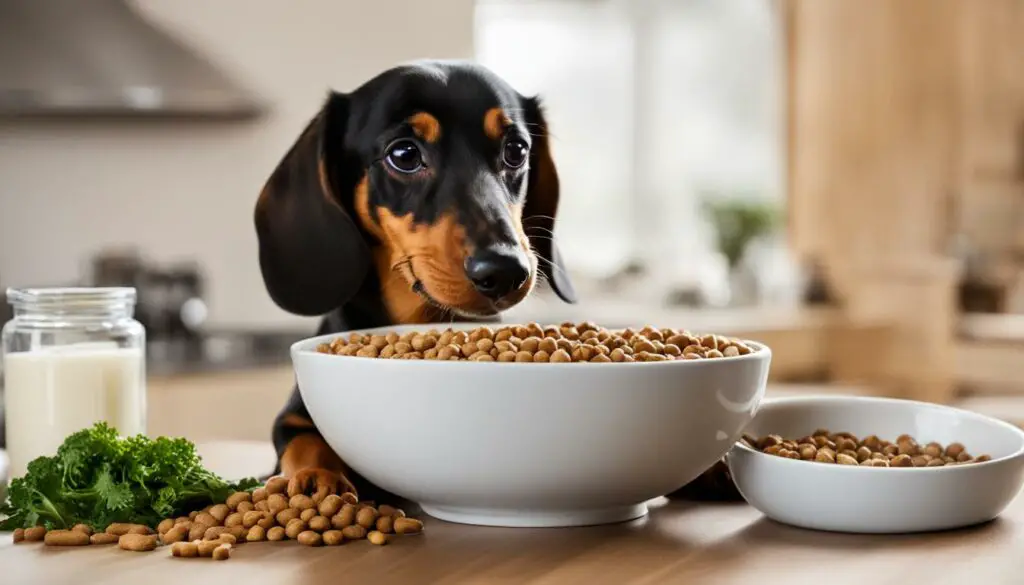
| Ingredient | Benefits | Recommended Products |
|---|---|---|
| Glucosamine | Promotes joint health and repair of cartilage | Brand A, Brand B |
| Chondroitin | Supports joint health and reduces inflammation | Brand C, Brand D |
| Omega-3 Fatty Acids | Has anti-inflammatory properties and improves mobility | Brand E, Brand F |
| Weight Management Formula | Supports weight loss and reduces strain on joints | Brand G, Brand H |
Tips for Transitioning Your Dachshund to a New Diet
Transitioning your dachshund to a new diet requires a gradual approach to ensure a smooth adjustment. Sudden changes in food can lead to digestive issues or refusal to eat. To make the transition easier for your dachshund, follow these tips:
- Start by mixing a small amount of the new food with their current food. Aim for a ratio of 25% new food to 75% old food. Gradually increase the proportion of new food over a period of several days.
- Observe your dachshund’s response to the new diet. Look for any signs of discomfort or digestive upset. If your dachshund is experiencing diarrhea or vomiting, slow down the transition process.
- If your dachshund is not showing any adverse reactions, continue increasing the proportion of new food until you have completely replaced the old food.
- Monitor your dachshund’s appetite and overall well-being during the transition period. If you have any concerns, consult your veterinarian for guidance.
Remember, each dachshund is unique, and the transition time may vary. Some dachshunds may adapt quickly, while others may require a longer adjustment period. Patience and consistency are key to a successful transition.
Transitioning your dachshund to a new diet is an opportunity to provide them with the nutrition they need for optimal health. With a gradual approach and careful monitoring, you can ensure a smooth transition and set your dachshund on the path to a balanced and nutritious diet.
| Transition Tips for Dachshunds | Benefits |
|---|---|
| Start with a small amount of new food | Allows gradual adjustment to new flavors and ingredients |
| Increase the proportion of new food gradually | Minimizes the risk of digestive upset and refusal to eat |
| Monitor your dachshund’s response to the new diet | Helps identify any adverse reactions or discomfort |
| Consult your veterinarian if you have concerns | Provides professional guidance tailored to your dachshund’s needs |
By following these tips and keeping a close eye on your dachshund’s well-being, you can successfully transition them to a new diet that meets their nutritional requirements and supports their overall health.

How to Ensure Your Dachshund Gets the Right Nutrition
Proper nutrition is essential for the overall health and wellbeing of your dachshund. As a responsible dog owner, it is important to ensure that your dachshund is receiving the right nutrients to maintain a healthy lifestyle. Here are some key tips on how to provide the best nutrition for your furry friend.
Feeding Guide for Dachshunds
Feeding your dachshund correctly starts with understanding their specific dietary needs. The amount of food your dachshund requires depends on factors such as age, size, and activity level. Referencing a feeding guide can help you determine the appropriate portion sizes to avoid overfeeding or underfeeding. It’s important to monitor your dachshund’s body condition and adjust portion sizes accordingly to ensure they maintain a healthy weight.
Consulting a Vet for Dachshund’s Diet
While general feeding guidelines can be helpful, it is always recommended to consult with a veterinarian for personalized dietary recommendations for your dachshund. A vet can consider your dachshund’s specific health conditions, such as allergies or sensitivities, and provide tailored advice on the best food choices. They can also guide you on selecting the right balance of protein, carbohydrates, and fats to meet your dachshund’s nutritional needs.
Ensuring Proper Nutrition for Dachshunds
Ensuring proper nutrition for your dachshund goes beyond choosing the right dog food. It’s essential to provide a well-rounded diet that includes a variety of nutrients. This can be achieved by incorporating different protein sources such as chicken, beef, and fish, along with vegetables and grains. Remember to provide fresh water at all times to keep your dachshund hydrated. By following these guidelines and consulting with a vet, you can ensure that your dachshund gets the right nutrition to thrive.

| Key Tips | Benefits |
|---|---|
| Refer to a feeding guide | Helps determine appropriate portion sizes |
| Consult with a veterinarian | Provides personalized dietary recommendations |
| Provide a well-rounded diet | Ensures a variety of nutrients |
Final Thoughts on Finding the Best Dog Food for Dachshunds
In conclusion, finding the best dog food for your Dachshund is vital to their overall health and well-being. By understanding their specific dietary needs, you can ensure they receive the optimal nutrition they require. From portion sizes to key ingredients, every aspect plays a crucial role in their nutrition.
Consider the recommended dog food brands based on different requirements, such as age, skin issues, and joint problems. These brands have been carefully selected to provide the necessary nutrients for your Dachshund’s specific needs. Transitioning your Dachshund to a new diet should be done gradually, allowing their digestive system to adjust smoothly.
Remember to consult with a veterinarian for personalized guidance on your Dachshund’s diet. They can provide valuable insights and tailor their recommendations to your Dachshund’s unique requirements. With their expertise, you can ensure your Dachshund receives the right nutrition for their size, age, and activity level.
In conclusion, by prioritizing your Dachshund’s nutrition, you are setting them up for a long and healthy life. The right dog food will not only keep them happy and satisfied but also support their specific needs, such as joint health, skin issues, and weight management. Give your Dachshund the gift of excellent nutrition, and watch them thrive!
FAQ
What are the caloric requirements for dachshunds?
Standard dachshunds need an average daily caloric intake of 922 calories, while miniature dachshunds require 404 calories per day.
What are the key ingredients to look for in dachshund dog food?
Dachshunds need a diet rich in protein, easy-to-digest meat sources, vegetables for fiber and nutrients, omega oils for skin and coat health, and calcium for strong bones.
What ingredients should be avoided in dachshund food?
It’s best to avoid diets with excessive carbohydrates and fats, as well as artificial ingredients that may trigger allergic reactions.
What are some recommended dog food brands for dachshunds?
Orijen Adult Dog Food, Royal Canin Dachshund, Hill’s Science Diet Sensitive Stomach Dog Food, Purina Pro Plan Weight Management Wet Dog Food, and Taste of the Wild Pacific Stream Grain-Free Dry Dog Food are all highly recommended for dachshunds.
Is raw food a good option for dachshunds?
Raw food is considered the best diet for dachshunds due to its natural, whole-food composition and its ability to prevent common health conditions.
What dog food brands are recommended for dachshunds with skin issues?
Grain-free dog food with high-quality protein, healthy fats, and essential nutrients from vegetables and berries are ideal for dachshunds with skin issues.
Are there specific dog food options for dachshund puppies?
Yes, there are specific formulas designed to support the growth and development of dachshund puppies.
What dog food is best for dachshunds with joint issues?
Dog food with ingredients like glucosamine and omega fatty acids can support joint health in dachshunds.
How should I transition my dachshund to a new diet?
It’s important to transition gradually by slowly incorporating the new food while reducing the old food to allow your dachshund’s digestive system to adjust.
How can I ensure my dachshund gets the right nutrition?
Follow a feeding guide based on your dachshund’s age, size, and activity level, and monitor their body condition to adjust portion sizes accordingly. Consulting a veterinarian can provide personalized guidance.

